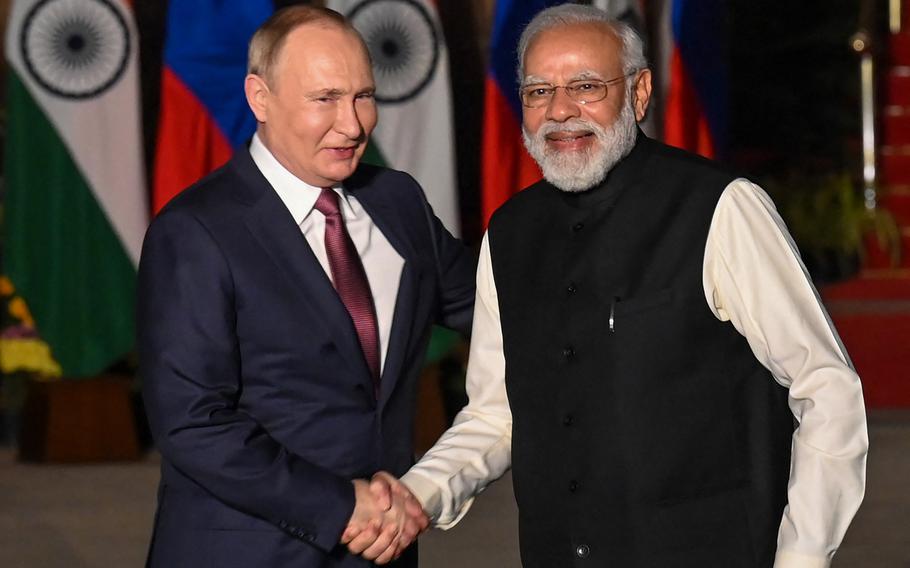
India's Prime Minister Narendra Modi, right, greets Russian President Vladimir Putin before a meeting at Hyderabad House in New Delhi on Dec 6, 2021. (Money Sharma/AFP)
(Tribune News Service) —Growing calls for the European Union to ban Russian oil imports may be overlooking a crucial flaw in its strategy to punish Moscow: India.
The South Asian nation is becoming a huge buyer of Russian oil, snapping up crude cargoes that are going unwanted by European importers. And with several European countries and oil majors self-sanctioning Russian purchases and starving themselves of fuel, India is already profiting from selling diesel onward to Europe.
If Europe adopts official sanctions on Russian crude and fuel, prices will likely surge, and India could profit even more from refining Russian oil to fuels it then sells to Europe for more money.
It’s a plot twist that reflects how complex it is for the EU to untangle itself from Russian energy imports. Though the bloc is making strenuous efforts to move away from its oil and gas, a country like India could keep profiting by selling fuel made from Russian crude to energy-starved Europe. That would weaken the argument of some EU countries, which are calling for punishing the Kremlin by not funding its energy sales.
“That is the cost of sanctions or self-sanctioning,” said Jonathan Leitch, an oil analyst at Turner, Mason & Co. Shipping Urals grade Russian crude to India and refining it to then sell it to Europe, “adds a lot of unnecessary tonne/miles and gives a larger profit to the Indian refiners and results in a higher retail price for the consumer.”
Indian refiners — state-run and private — have stepped up processing Russian barrels from last month onwards and the volumes will rise as more shipments start arriving this month and next after processors aggressively bought the cargoes shunned by others, according to refinery officials, who asked not to be named discussing internal business matters.
India’s diesel exports in March were the highest since April 2020 when they hit 847,000 barrels a day, according to Jane Xie, a senior oil analyst at the data and analytics firm Kpler in Singapore. “About 30% have ended up in Europe where prices of ultra low sulfur diesel were $100 a ton costlier than in Singapore last month.”
State-run refiners including Indian Oil Corp. and Bharat Petroleum Corp. have been buying Russia’s flagship Urals grade and its Sokol crude, according to refinery officials. While the refiners mostly sell domestically, they have stepped up exports in order to cash in on higher international prices, the officials said. India’s Nayara Energy Ltd., which is backed by the Russian oil producer Rosneft PJSC, has also bought some Russian crude, according to two Indian traders.
“Like any other refinery, Nayara Energy optimizes its crude basket with the aim to achieve the best option for our refinery,” the company said in an emailed response to questions. “Feedstock is supplied through ongoing agreements and spot trades. In parallel, we are augmenting our product sales through appropriate channels.”
Though Europe is planning to phase out Russian coal purchases, the EU hasn’t stopped using Russian oil. In fact, exports of Russian diesel to Europe are seen at a “relatively strong level” of 860,000 barrels a day in March, according to Vortexa. It is very difficult “and in some cases impossible to trace the heritage of oil products,” Turner’s Leitch said. “I can’t see how, even if they wanted to, European product importers would be able to reject certain Indian diesel volumes due to them being refined from Russian crude.”
Relying on Russia
Europe, which relied on Russia for about a fifth of its diesel imports in 2019, has been scrambling to find alternatives as concerns mount over the prospect of supplies running out.
India’s proximity to European markets gives it an advantage over other Asia Pacific refiners. Xie estimates that a voyage from Jamnagar to Rotterdam would take about 22 days, while a trip from Ulsan in South Korea to Rotterdam trip could take about 38 days.
Indian Oil and Bharat Petroleum didn’t respond to emails seeking comment.
India has pushed back on the entreaties of Western nations to scale back the country’s relationship with Moscow, saying it wants to continue buying cheap Russian oil to protect its own interests.
While Indian companies’ purchases of Russian oil are a tiny fraction of the total amount imported from overseas, the cheap price at which they are being offered the oil from state-run Russian companies could become a boon. Such purchases would make imports even more attractive for Indian refiners than spot purchases from traders.
___
©2022 Bloomberg News. Visit at bloomberg.com.
Distributed by Tribune Content Agency, LLC.